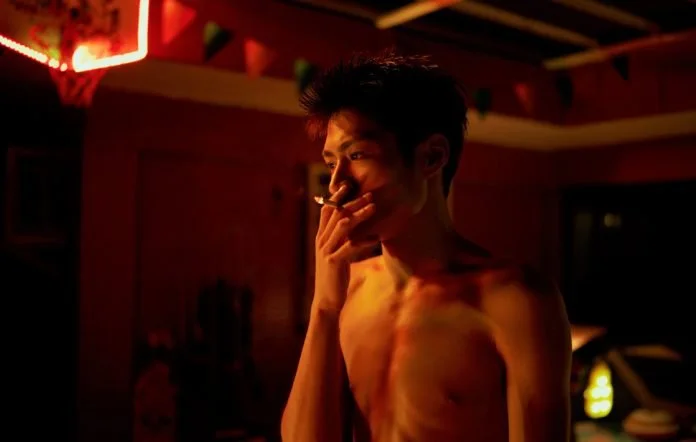Review: Taiwan Film Festival 2022 — Multi-varied meditations on time, the media, and digital technologies
I never wanted those dim lights to rise.
Image Credit: Taiwan Film Festival Australia
I was greeted by a black and white sea of suits, tuxedos and sparkling dresses. Eager guests shuffled their way through the bustling foyer to the neon-lit bar. With my QR code scanned, I found myself neck deep at the VIP pre-screening mixer of Goddamned Asura, rubbing shoulders with industry bigwigs from across the pond and knocking back taro and sweet potato rice balls in between glasses of sauvignon blanc. Before I could get too acquainted with representatives of TAICCA (Taiwan Creative Content Agency), we were ushered into the theatre and found our seats. Sinking into my chair as the lights dimmed, I prepared myself for another year at the Taiwan Film Festival.
July saw the Taiwan Film Festival (TFF) return to Event Cinemas George Street and Parramatta for its fifth and most ambitious year in a row. Featuring a stacked lineup of 11 brand new features, a collection of shorts, and two retrospective screenings, the festival also hosted an industry circle panel and director-actor Q&As. I saw four films at the festival — Goddamned Asura; Till’ We Meet Again; Green Jail; Taipei Dad, New York Mom (Unfinished) — each one containing multi-varied meditations on time, the media, and digital technologies.
The opening night feature, Goddamned Asura, follows the aftermath of a random shooting at a city night market. Tracing the lives of several disparate individuals, the film takes audiences on an intimate journey through their reactions to the event, with a reporter attempting to investigate the reasoning behind this act of violence.
On a more light-hearted note, Till’ We Meet Again is a fantasy comedy about a man struck by lightning, who attempts to gain a second chance at life after he finds himself stuck in a bureaucratic yet unorthodox afterlife.
Image Credit: Machi Xcelsior Studios
While the aforementioned films are fictional stories, Green Jail is a poetic documentary about the life of Grandma Hashima, the last existent from colonial Taiwan, who bore witness to the horrific crimes against humanity inflicted on coal miners amidst the luscious, sublime landscape of Iriomote Island, pre-World War II.
Taipei Dad, New York Mom (Unfinished) is another documentary, this time piecing together home movies and VHS footage of the director’s large extended family. An auto-biographical look at the director, Mickey Chen’s film was left unfinished due to his untimely death in 2018, and thus carries with it simultaneously a sense of promise, but also profound loss.
All of these films are about the past, and how decisions made then can affect the future. Goddamned Asura is split into thirds, with acts two and three mirroring each other. With slight changes to characters’ decisions, we can see how things might have played out differently, whether the protagonist commits the shooting or not. In Taipei Dad, Chen’s sister is established to have passed away when the director was a young age. Both this, and the divorce of his parents, play a significant role in the trajectory and lives of all of the family members, each of them carrying the trauma with them throughout. Green Jail is all about the ripple effects of colonialism on our world and how we still feel its impact today; while Till’ We Meet Again explores karma and the repercussions of what we do when we’re alive.
At the same time, the films explore the nature of media - in particular, Goddamned Asura. In a Q&A afterwards, director Yi-an Lou spoke of how the film was inspired by a series of random killings in Taipei. Seeing the way the news brushes over, generalises, and even glamorises these events, Yi-an Lou sought to investigate the humanity and moral complexity around these subjects, suggesting there is no objective good or evil. As a freelance journalist begins investigating the individuals surrounding the perpetrator, and we as audiences see their lives prior to the incidents, we gain a greater understanding of their minds as well as a more critical eye towards the manner in which mainstream media covers these sorts of events.
Image Credit: Content Digital Film Co., Ltd; SEASHORE IMAGE PRODUCTIONS CO., LTD.
Both Green Jail and Taipei Dad also play with the documentary form, subverting our expectations for a journalistic representation of reality in favour of a more poetic and emotionally cathartic form. Green Jail, while grounding itself in the historical events of what occurred at the infamous ‘Green Jail’ coal mines, the film contrasts and traces the perspectives and daily life of Grandma Hashima. We follow her as she takes us on asides picking weeds from the ground, dealing with door-knockers collecting money, and watching TV. In one of the most engrossing parts of the film, Hashima tells us the story of her green bangle - an innocuous detail in any other movie, but here gains powerful resonance within the broader context of colonialism and abuse endured on the island.
Besides Hashima, we also drift off in these sensory visits through the forest, with extreme close-up shots of nature and an evocative soundtrack ebbing and flowing between the diegetic and non-diegetic. Director Yin-Yu Huang also provides little asides that follow the life of neighbour Luis, an American NEET who emigrated to Japan when he was a child and is renting out a spare room in Hashima’s house. Luis provides some much needed levity to what is already a dark and tragic film, as he plays video games and annoys Hashima. In the Q&A afterwards, someone asked why Yin-Yu Huang kept Luis in the final product, to which he responded it was absolutely necessary, as he provided an extra layer of humanity to an already complex story, and that he fought tooth and nail for Luis to remain in the final product.
Image Credit: Yin-Yu Huang
Green Jail shifts in and out of reality, playing with temporality as we flash back to recreations of the conditions coal miners endured. The film uses archival footage in an act of multimodal resurrection, and special effects are used to make loin-clothed actors seem transparent amongst the claustrophobic landscape. Yin-Yu Huang brings in interviews of people talking about their supernatural experiences on the island, with the ghosts of a colonial past haunting the residents of the island to this day.
Similarly, Taipei Dad is a non-linear film bereft of any sort of narrative or flow, composed almost entirely of home video footage. The film gains its power through the connections you make in proximity with this family, and the emotions you experience alongside them. You feel as though you are amongst them, hanging out with them, as they laugh, cry and share these life events with one another.
The films also provide a disturbing mirror to our hyper-digitised landscape. Screens surround the individuals in each of the stories of Goddamned Asura. While the director stated he did not want to evoke any discernible reason for the characters’ violence, the prevalence of screens draws a curious connection between the shootings and technology. The afterlife is stripped of all its biblical reverence in Till We Meet Again, reduced to a bureaucratic nightmare of computers, filing cabinets and corny instruction videos. Green Jail tethers the colonial expansion of Japan to an industrial one as well, with shots lingering over the invasive technologies and waste of capital left amongst the sublime forest. Luis taking us through his collection of bottles he's picked up from the ground transforms from a humorous aside to a lamentation over the tumultuous detritus left behind. Master shots of foreboding construction sites showcase the island pushing itself artificially further and further outward.
Image Credit: Mickey Chen
Taipei Dad, however, contrasts these negative portrayals of technology, with the digital camcorder serving as a vessel for profound emotional storytelling. The digital fuzz, the diegetic sound of the camera's buzz, it all emanates the warm, comforting glow of the home movie aesthetic.
Overall, the Taiwan Film Festival was a joyous experience. As I polished off the last of my drinks and scoured the bottom of my final box of popcorn, I was devastated it was all over. I never wanted those dim lights to rise. But alas, I had to shuffle out of the cinema, transported back from my journey across the world to come face to face with the hustle and bustle of George Street. The light rail whirring by and the local buskers singing along to PSY’s Gangnam Style over a pair of loudspeakers. I walked to The Lobo on Clarence Street, letting a cold cocktail wet my whistle and letting the films I had just watched wash over my mind. I hope to return to the magical realm of the cinema sooner rather than later.
The Taiwan Film Festival ran from 27 July to 13 August across Australia. The festival will return in July 2023.





